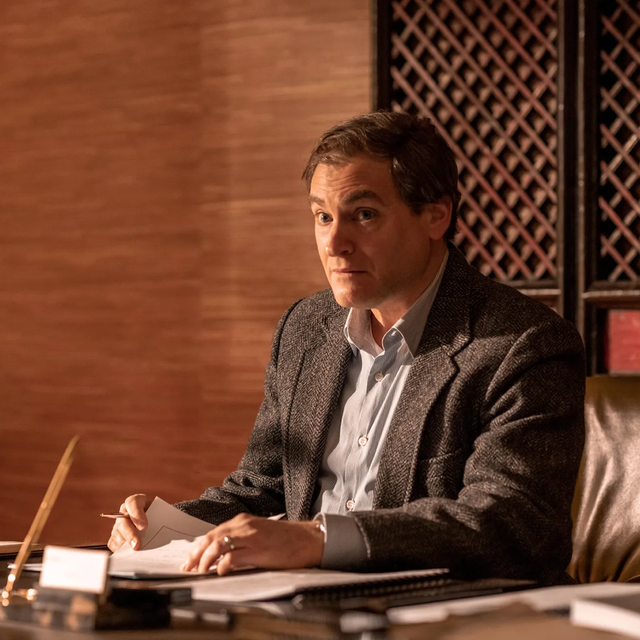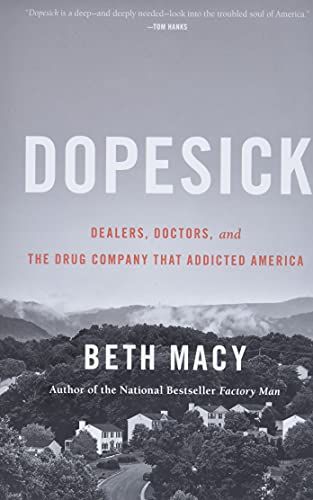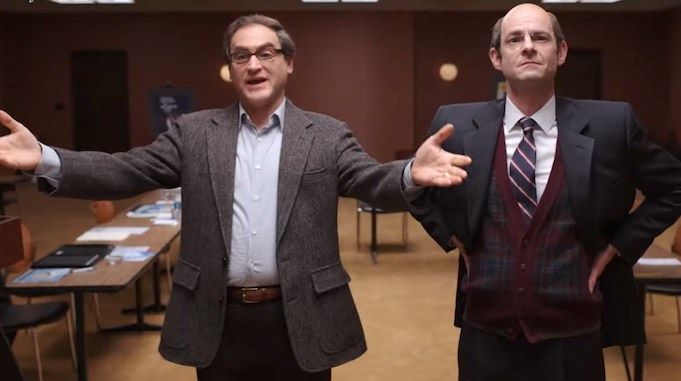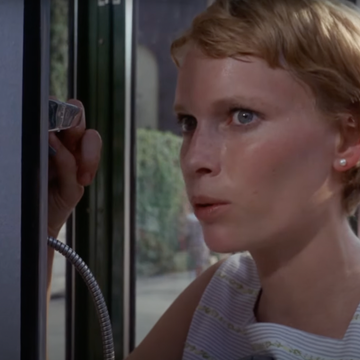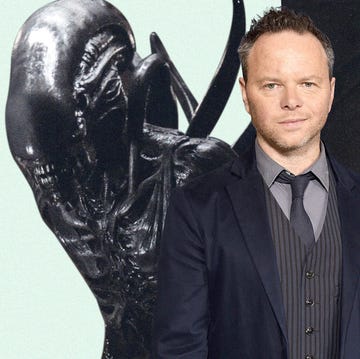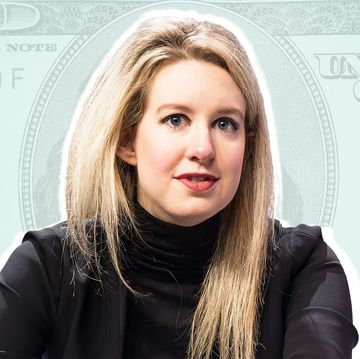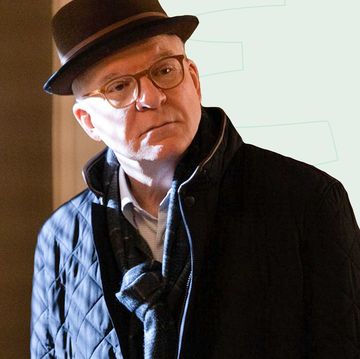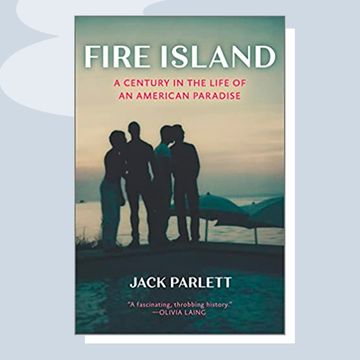In the fifth episode of “Dopesick,” Hulu’s heart-wrenching scripted drama about the opioid crisis, viewers are treated to a boardroom brawl between billionaire septuagenarian brothers. Raymond and Mortimer Sackler come to blows in the middle of the Metropolitan Museum of Art’s Sackler Wing following the ouster of Mortimer from day-to-day leadership at the family business, Purdue Pharma.
For Mortimer, a notorious bon vivant partial to cravats, the rise of his nephew, Richard Sackler, as Purdue’s new president is a shocking and distressing development. Mortimer flies out of his seat, lunges for Raymond then screams: “You are a miserable son of a bitch!” But Richard, played with bone-chilling intensity by Michael Stuhlbarg, barely even moves. He just sits there at the long table, the corners of his mouth morphing from a scowl into some semblance of a smile.
Adapted by showrunner Danny Strong from journalist Beth Macy’s 2018 book by the same name, “Dopesick” tells a sprawling story that unfolds over the course of decades, involving dozens of characters in far-flung locations. There are Congressional hearings featuring Sackler family members in the 1960s and then again in the 2000s, investigations at the DEA and the U.S. Attorney’s Office as well as personal stories of a fictitious Applachian doctor (Michael Keaton) and one of his young pain patients (Kaitlyn Dever). The ravages of addiction in Appalachian towns is juxtaposed with the opulence of the Sackler family’s day-to-day existence, high above all the damage their wonder drug has unleashed on the world.
For Stuhlbarg, who has played many real-life characters in his long career–including Apple’s Andy Hertzfeld in Steve Jobs and Arnold Rothstein in Boardwalk Empire–embodying a person who is not only still alive but extremely in the news was a unique experience. Under normal circumstances, Stuhlbarg embraces any opportunity to meet the person he’s about to portray on stage or screen. But in this case, meeting Richard Sackler wasn’t going to be an option: his lawyers went so far as to send Stuhlbarg’s attorneys a letter before filming began last year.
We talked with Stuhlbarg on Zoom about his research process and how it informed his interpretation of the guy known throughout Purdue Pharma as “Doctor Richard,” as well as what he thinks about the recent $4.5 billion settlement that dissolved Purdue while largely absolving the Sacklers of liability.
ESQ: Let’s talk about that moment in the museum, when Richard orchestrates this boardroom coup. What’s he smiling about? Is he feeling joy–or is it schadenfreude?
Michael Stuhlbarg: Wow. Let me think for a moment. Mortimer and Richard, from what Danny could glean about their relationship, have a long and sordid history in our version of the story–I'm going to probably keep saying “in our version of the story.” Mortimer was not terribly kind to Richard when he was growing up. And this moment is, I guess, a kind of comeuppance. Once Richard discovers that he can get enough votes to take control of the situation, he does it. And I think it's something he always knew eventually would happen, because in our version, Richard knew more than anyone else. All of his energy was directed towards championing this drug. And I don't think he would have necessarily had the same freedom, had the existing hierarchy before Richard became president existed. So he did what he could to change the situation.
ESQ: This family basically used the Metropolitan Museum of Art as their own corporate headquarters.
MS: Yeah, and all that springs back to Arthur [Sackler, brother of Raymond and Mortimer], you know, and his passion for Chinese art, and deals that he made with the museum to be able to utilize their facilities for his own personal reasons.
ESQ: Richard is very preoccupied with his uncles, especially Arthur. There's an interesting scene in the first episode when Richard is in his bedroom standing in front of this Chinese painting that was part of Arthur’s collection, and he says to his wife, “I’ve always despised that piece.” What was that about?
MS: I love the idea that Richard puts this painting that he hates on the wall right next to where he sleeps, so when he sees it the first thing every morning it feeds his anger and his obsession with trying to be more than his uncle ever was.
ESQ: When Richard finally wins this battle to control the company, there’s this stillness in your face as this fight breaks out, as if you’re thinking, “Dad and Uncle Morty are going to destroy each other and I'm just going to sit here and watch it unfold and be amused.” Would you agree with that?
MS: Sure. In many ways Richard doesn't mince words. One of the fascinating aspects of getting to learn about him as a person was watching the eight-hour deposition video that's available online. Anyone can watch it. He has this sphinx-like quality. It's quite a revealing piece of videotape.
ESQ: Is that video the primary thing that you looked at when you were researching for this role?
MS: It was one of the main things. Besides reading stuff on him, when you get to see the person you learn an awful lot very quickly. And the more you look at it the more you learn, how he comports himself, how he chooses his words so very, very carefully.
ESQ: What was it like playing someone who was so wrapped up in current events?
MS: I've played people who had recently passed away. I’ve played people who were still alive, Like Andy Hertzfeld [from Apple]. I got to meet him. But as far as playing someone with the attentions of all the world's cameras hitting him right now, yeah, it's uncanny. At the time that we were making this series there was something like 2,500 lawsuits pending.
ESQ: Danny Strong mentioned in an interview that someone in the Purdue Pharma camp wrote a letter to you?
MS: Yes, Richard’s lawyers did.
ESQ: They sent it directly to you? How did you receive this communication from them?
MS: I received it through my representatives and they forwarded it to me. I think it was my lawyer who received it, if memory serves. I'd never had any direct communication with them or their lawyer, but the letter was just about their concern about the story that they thought we would be telling and wanting us to know certain things. I think they felt that some of the elements in Beth Macy's book may have misrepresented them, or something of that nature.
ESQ: You didn’t want to engage with them?
MS: Once things veer into the world of legalities, I let other people deal with it. You know, if someone wants to have a friendly conversation, that's one thing. If lawyers start talking to each other, it becomes something else, so I act on advice of counsel. The lawyers dealt with each other and I stayed out of it.
ESQ: That's unusual, right? Receiving a letter from the lawyer of the person who you are about to play on TV?
MS: Yeah, that's never happened to me before.
ESQ: Would you have been open to having a conversation with Richard Sackler had he wanted to chat?
MS: That wasn't what was put on the table, but I like to believe that I am as open minded a person as anyone, particularly with the job that I do, with the opportunities I have to walk in other people's shoes. I want to sift through as much information as possible. Yes, in an ideal situation I would love to speak to the person I would be playing. In fact, at the moment, I'm playing criminal defense attorney David Rudolf [in HBO’s upcoming true-crime series “The Staircase.”] I went to visit him and we had the most lovely day. He's made himself completely available to the entire cast to learn about the things that he knew and the things that he didn't know and his personal relationships. I love that stuff.
ESQ: As an actor, your job is basically to be empathetic and consider other people’s perspective, but as I was reading that book I kept thinking that this family seems to be lacking an empathy gene.
MS: It's fascinating because there were the three brothers Arthur, Mortimer and Raymond–and their parents [Isaac and Sophie Sackler] were grocers in Brooklyn. And as far as I understood, their parents, their father in particular, was one of the most empathetic people you'd ever meet. He’d give you the shirt off his back, literally. And as it turns out, it didn't help his business very much. I think because of his generosity, they lost their business and the kids had to fend for themselves. Arthur was ingenious in that he single-handedly created medical advertising. He financed his younger brothers’ educations through medical school. It was a remarkable rise from nothing to domination in a particular field. So it's funny to hear you say that they lack empathy. I think in one sense, if you're creating a medicine that is addictive, and in some cases, killing people, yes obviously there's a blind spot. However, their original goal, and I think perhaps where Richard’s focus must have been was, as he says in our story, to “heal the world of its pain.” In Richard’s mind, anyone who didn't take the medication as directed by a “responsible” doctor wasn't really in his purview.
ESQ: In “Dopesick,” you repeatedly see Richard dismissing or ignoring any evidence that did not support his core belief that oxycontin was healing the world of its pain. Whenever you see someone on the show telling him something he doesn't want to hear he just says, “Thank you, thank you” and shuts it down–or if he really can’t deal with it, he'll pet his dog. Tell me about this.
MS: I fell in love with that dog. I think the Sackler dog, Unch–as far as we know that was what its name was–was a smaller breed than the dog that we ended up with, whose name was Tank. Tank was so adorable and so cute. I just couldn't get enough of him and Danny was charmed by how much it seems that Richard's love for his dog was so completely different from how he behaves with people in his life. There was something pure about it and it was a really fun element to play with. His heart was wide open with his dog.
ESQ: Could you tell me how you first heard about this role?
MS: I never would have cast myself in this part, ever. It kind of took me aback when it was sent to me, but I was excited by the prospect of getting to work with Danny and Barry [Levinson], and it was a wonderful opportunity to play a very complicated person. There weren't any downsides to it at all. It’s a fascinating family. [Richard] is someone with a remarkable drive and a chip on his shoulder, with something to prove. I was also so moved by all the other stories that everybody else was going through. The first Zoom reading we had as a company, before we had shot anything, was just remarkable. We were all sitting around our computers and hearing it aloud, and everybody was so well cast in their roles. I couldn't wait to see how this would all manifest.
ESQ: There were probably a lot of people on that Zoom call who you never even interacted with the whole time you were shooting, right?
MS: Yeah, most of them. I had one interaction with Rosario [Dawson] and none with Michael [Keaton] and none with Peter [Sarsgaard] and John [Hoogenakker] or Kaitlyn [Dever]. We were all kind of in our own separate stories. It was great to have moments when the worlds would intersect. It was a very special day to get to work with Rosario for that one scene [also in Episode 5], because both of our stories were kind of leading up to this to that moment.
ESQ: You’re talking about that scene when Rosario–playing tough-as-nails DEA agent Bridget Meyer–is yelling at you and you're just sitting there looking at the table and pushing around some papers. What are those papers supposed to be?
MS: [Laughs] It's a mystery. It's funny, these were elements that were given to me on the page, honestly, that I just sort of found justification for in the moment. It was written that way.
ESQ: It was written that you were just kind of playing with small pieces of paper?
MS: It was as if things were being said that I either didn't want to hear or was ignoring–or perhaps Richard was getting uncomfortable. Under the circumstances, it just felt like it was what Richard needed to do in the moment.
ESQ: Was it a challenge as an actor to turn somebody whose chief personality trait is that they are uncharismatic and quiet into a compelling character?
MS: It wasn't really something I set out to do. I think [Richard] was so preoccupied in our story with what he was doing [with the business] that he probably didn't care to waste a second on any kind of social interaction. So he felt he didn't need to ingratiate himself with anyone. He, if anything, was trying to prove a point to his father, to his uncle and to the family, that he was more than they thought he was. He seemed like a pretty lonely person to me.
ESQ: Maybe this is a banal observation, but Richard’s character reminded me of Hannah Arendt’s concept of the banality of evil. His main objective was to grow the family business and make money for the company, and as a result he inflicted tremendous evil on the world.
MS: I think that’s fair to say. He was tunnel-visioned toward his goals. The rest of it didn't matter to him.
ESQ: What was your reaction to the bankruptcy news last month, that the Sacklers will pay $4.5 billion, but no one's going to prison?
MS: It didn't surprise me. They're very smart and unless it can be proved that [the Sacklers] individually did something, that's how it's going to stay. So the company may completely disappear. But it doesn't mean that those individuals couldn't create another company and do something similar all over again. So, unless somebody creates some laws to make individuals accountable, that is how it's going to remain. People are going to be banging their heads against the wall until different laws are in place.
ESQ: I think at the very least, when you go into the Metropolitan Museum of Art perhaps you should not be seeing the Sackler name hanging over the Temple of Dendur.
MS: I think it's more difficult these days for people to hide things if they are philanthropists. People know where the money is coming from so it's up to those institutions to make those decisions themselves, if they want to accept such exorbitant gifts knowing that the money came from hurting people or killing people.
ESQ: Maybe there will be a whole second season of this show once this all plays out.
MS: It is not resolved and it's a fascinating story. I wouldn't be surprised if something like that were to happen.
